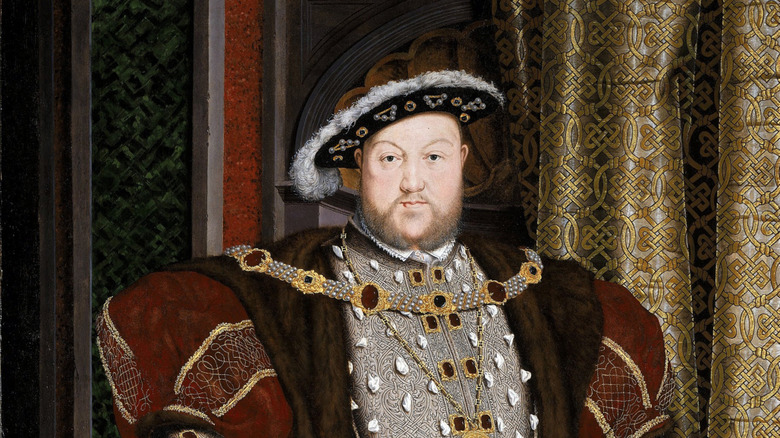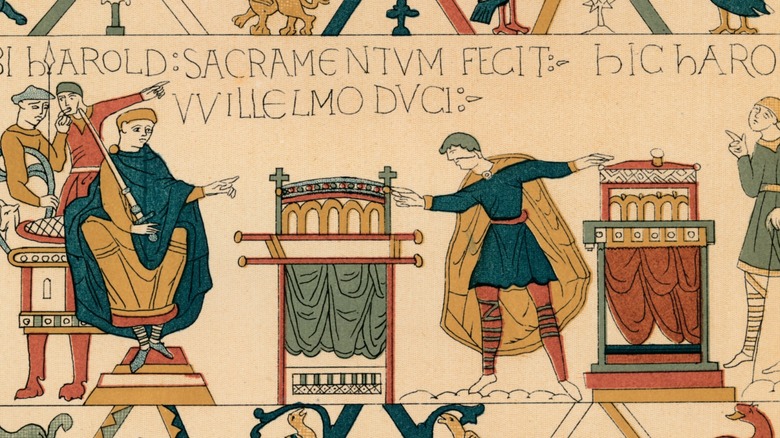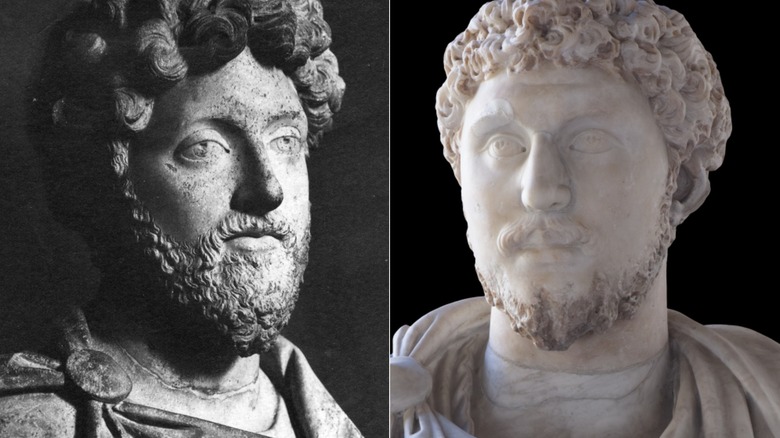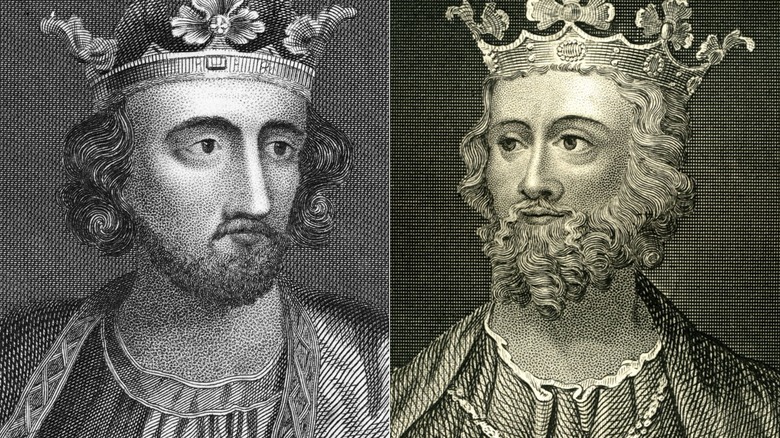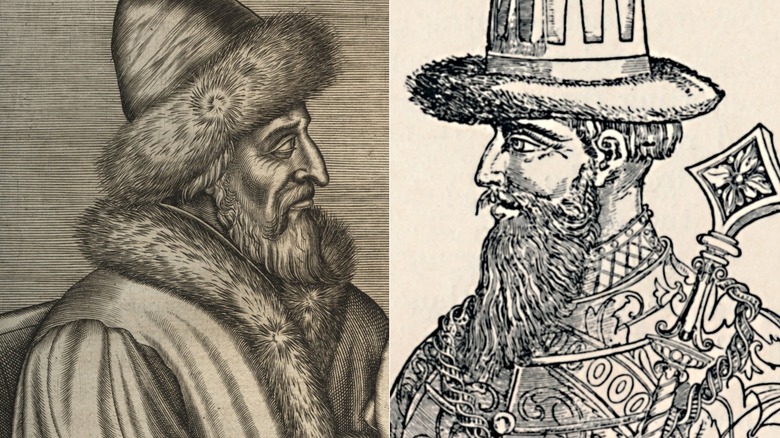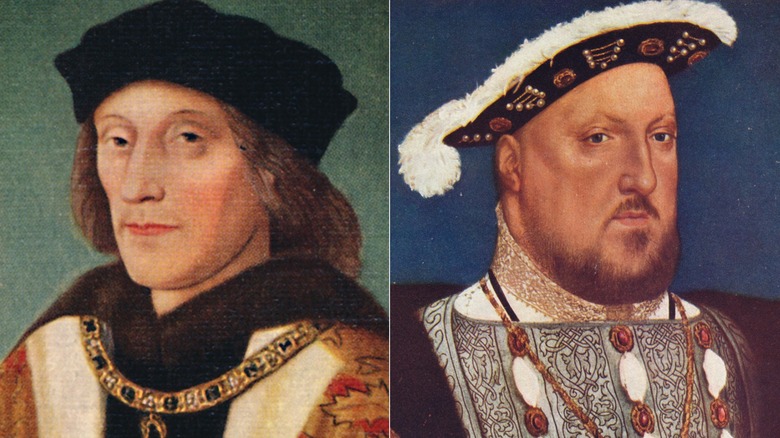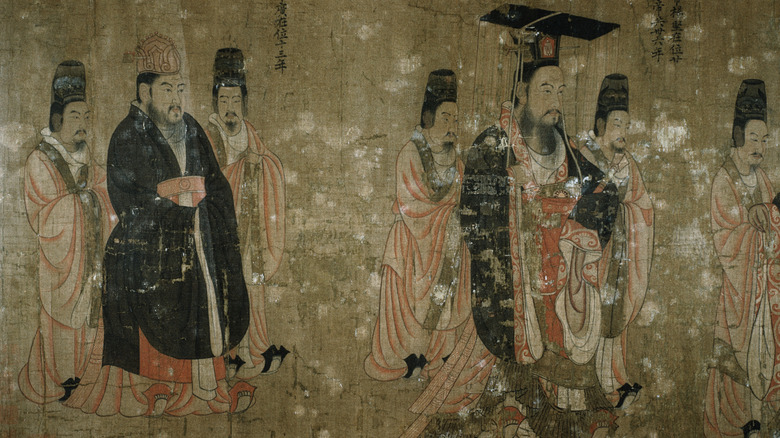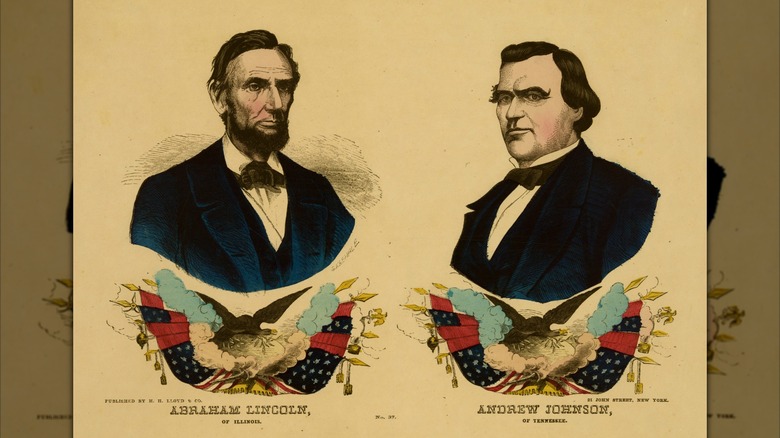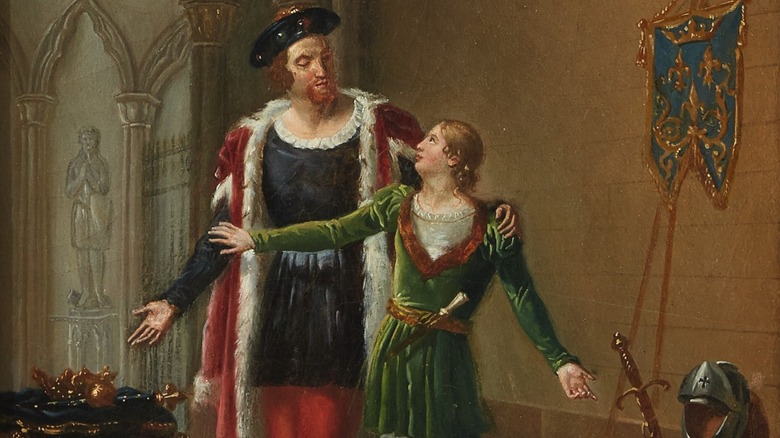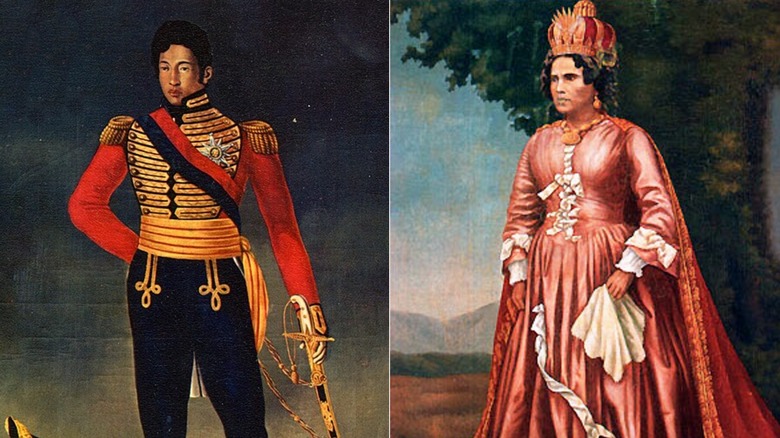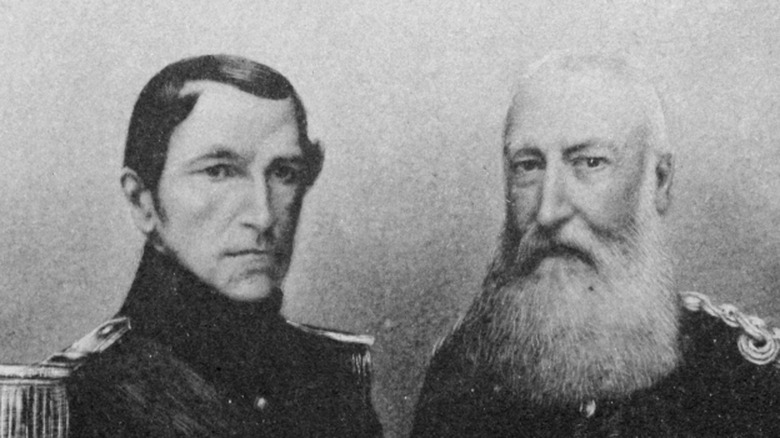The Worst Successive Rulers In History
Since power corrupts, it is hard to argue that any rulers in history have been truly "good." But reasonable people can agree that some have been much better than others. And when those decent rulers have been followed directly by ones who are unbelievably incompetent, evil, or just lazy, it makes the good ones look even better by comparison.
While no one on this list is going to qualify for sainthood, half of them at least managed to leave their kingdoms or countries in better shape than they found them, and passed on a strong nation to the next person to come along. Then that successor took the thriving economy, territorial gains, or military might they had been gifted and managed to screw it all up, making the populace wish for the halcyon days of the former guy. Sadly for them, there was no going back, and in some cases, things were only going to get even worse.
These are the worst successive rulers in history.
Harold II and William the Conqueror of England
Harold II is most famous for losing England — and his life — to William the Conqueror at the Battle of Hastings in 1066. But despite only ruling for nine months, he managed to save England from a completely different set of invaders. It was not just the French who were looking to take over parts of his country; the Vikings were arguably an even bigger threat. When Harald III Hardraade of Norway invaded the North of England, supported by Harold's own brother Tostig, the English king raced an army up north and won an epic and decisive victory. He even managed to kill both his brother and the king of Norway.
But William the soon-to-be Conqueror invaded the South of England two days later. Harold was forced to rush his victorious troops back down the length of the country. Exhausted, they should not have stood a chance against William's forces — yet they came very close to winning that battle too.
Not everyone in England was happy with William taking over, particularly those in the North. This was made even worse when the new king decided the best way to stop the Danish from invading was the "harrying of the North," a campaign of pillage and terror that destroyed towns, churches, and food supplies. It took almost a decade for the area to recover; it is estimated that 100,000 people died. He also dealt with any hint of rebellion so viciously that other rulers were astonished by it.
Emperors Marcus Aurelius and Commodus of Rome
Marcus Aurelius is often considered the wisest Roman emperor and was the last of the "Five Good Emperors" of Ancient Rome. He was well-educated in religion and philosophy from the time he was a child. Not only did he put these lessons to use as a ruler, but he wrote them down. While they may have originally been notes, reminders, or motivation just for himself, today people still read his book of "Meditations" in an attempt to live a Stoic lifestyle.
On a smaller scale, but one that would have been much more immediately helpful to some of his subjects at the time, the emperor made safety equipment for child tightrope walkers compulsory. In the same way that some people watch NASCAR for the crashes, the Roman populace would wait to see one of these poor kids fall and injure themselves or even die. Marcus Aurelius said they had to use mattresses as crash pads.
Commodus was Marcus Aurelius' son and succeeded his father, co-ruling with him beginning in 177 AD, then fully taking over in 180 AD when Marcus Aurelius died. Commodus was so bloodthirsty and unhinged that he managed to end 84 years of peace in Rome. He is considered by some historians to be the worst emperor in the empire's history, which is really saying something. During his reign, he mostly concentrated on his 600-strong harem and playing pretend as a gladiator in the Colosseum, when he wasn't busy executing anyone he didn't like. He was so hated after 15 years of this that he was assassinated, and his death plunged the empire into a civil war.
Edward I and Edward II of England
Even though Edward I was away from home in Europe when his father Henry III died in 1272, he was already so popular with his subjects that no one bothered to try to usurp the throne from him in his absence. The first King Edward was known as a brilliant military leader, while at the same time, he had been deeply affected by the civil war in the country when he was younger, so he wanted peace above all else. To this end, during his reign, he also increased the power of Parliament and reformed the country's legal system. He was no less beloved in his personal life and was considered a notably loyal friend.
Edward II became king in 1307 and proceeded to do almost everything wrong from the start. His blatant favoritism and unpopular policies resulted in internal fighting with his barons, and eventually another civil war. Despite technically winning that war, the king never really got control of his own government. While his father had crushed Wales under his military might, Edward II suffered a devastating military loss to the country's other great enemy, Scotland, at Bannockburn in 1314.
He became so unpopular that his downfall came in the form of his own wife, Isabella of France, whose successful invasion saw her husband become the first king of England to lose his throne in over 300 years. He died, most likely murdered by his wife's allies, in 1327.
Vasili III and Ivan IV 'the Terrible' of Russia
Vasili III had the good fortune of taking over as grand prince of Moscow in 1505 from his father, Ivan III, who had been kicking all kinds of butt in that position for over 40 years. Still, Vasili could have screwed it all up, but he didn't. While his achievements were not as great as his dad's, there wasn't actually all that much left for him to do to strengthen Russia and make it more powerful. As it was, Vasili finished the centralization of the government and the conquest of lands now associated with Russia that was started by his father.
Ivan IV succeeded Vasili and has gone down in history with the sobriquet "the Terrible." That is really all you need to know, but the details prove how apt that nickname was for the tsar. Ivan terrorized his subjects, destroyed the country's economy, and his policies managed to depopulate entire areas of Russia. He created a group of thousands of ultra-loyal bodyguards called the oprichniki who helped Ivan sack whole towns and execute thousands of people in particularly sadistic ways. He became more and more withdrawn, leaving the day-to-day work of running the country to others, with the exception of the Livonian War against Sweden, Poland, and Lithuania, which dragged on for decades before Ivan admitted defeat. While his policies alone would have left his realm wakened, Ivan cemented the problem when he murdered his own heir in a fit of rage in 1581.
Henry VII and Henry VIII of England
Henry VII should never have been king. A minor member of the nobility, he only took the throne after the deaths of other heirs and then his decisive victory at the Battle of Bosworth over Richard III. This ended the War of the Roses and unified England again after decades of civil war. There, Henry VII proved to be a natural ruler. One of his first acts was to marry the daughter of his enemy, both cementing his position as king and uniting formerly warring factions. But his true genius was with finances. He was meticulous with money, almost tripling the royal income and leaving a very rich country when he died.
His son, Henry VIII spent all that money, as well as losing a pointless war with France that worsened England's economy. Henry VIII had six wives, famously, and when he invoked a deadly religious fight because he wanted to get divorced from the first one, it allowed him to loot the country's monasteries to help offset his spending. Even before he completely upended the social and religious order in the country, however, the younger Henry was already losing popularity with his people. He executed two wives and tens of thousands of his subjects.
Some have blamed Henry VII for Henry VIII's tyranny, so perhaps even though the older king was a successful leader, in the end, he failed his country by being a pretty terrible father who raised a bad kid.
Emperor Wen and Emperor Yang of Sui
Emperor Wen (also written Wendi) of Sui founded a short-lived but incredibly important dynasty in Ancient China. When the former emperor died suddenly in 580 AD, Wen managed to come out on top of all the people who tried to take the throne. The new emperor started building a monumental capital city as well as a complex canal system to improve trade and supply lines in the country. He consolidated power in a centralized bureaucracy and changed the system of getting government jobs from one of hereditary rights to a meritocracy. Through carefully planned military campaigns, Wen managed to unify many of the small warring states that covered much of the area of present-day China.
Emperor Yang (also written Yangdi) looked at all the great stuff his dad was doing and responded by assassinating him in 604. Now Yang was free to spend all the country's money himself. While he continued many of the construction projects started by his father, he was not mindful enough of his spending, especially when it came to how much of the country's money went to the emperor's personal projects that had no benefit for his subjects. Yang's biggest mistake was overstretching himself militarily. While he did have some successful campaigns and territorial gains, between 612 and 614, he lost a series of battles to Korea so badly that his people revolted. This resulted in Yang's own assassination in 618, ending his father's dynasty after just two generations.
Presidents Abraham Lincoln and Andrew Johnson
Despite the fact that they were on the same party ticket in 1860 and 1864, Presidents Abraham Lincoln and Andrew Johnson had very different ideas about slavery and the problem of the South. Lincoln made clear in his first inaugural address that he wasn't going to fight against the slave states unless they made him; once they fired the opening shots of the Civil War, however, he was a more than capable military leader. He won a second term of the presidency, then shortly afterward won the Civil War and ended slavery in the United States. In his second inaugural address, Lincoln explained that he knew how difficult reuniting the country would be, but that he had a firm but fair idea of how to approach it.
After Abraham Lincoln died, assassinated by the Confederate John Wilkes Booth, that plan went out the window. It did not help that Andrew Johnson was a racist and that informed his approach to domestic policy. Thanks to his autocratic leadership style, his own party ended up turning against him, and he became the first president to be impeached. His many terrible decisions ruined any chance of Reconstruction being effective, or of any real attempt at racial integration or understanding. Johnson might not have been able to bring back the institution of slavery (although he fought hard against the ratification of the 14th Amendment), but he wanted everything else just like it had been during the antebellum years.
Charles V and Charles VI of France
Charles V could not have become king at a more difficult time. In 1364, France was in the middle of the Hundred Years War with England and losing badly. While Charles V was not a brilliant military tactician himself, he was a very smart man who knew well enough to listen to those who did know how to fight a war. The result was an astonishing and seemingly impossible comeback from the brink of defeat. A natural intellectual, Charles V renovated the Louvre palace and made it a place of beauty and learning. He also reformed the tax system, pursued successful diplomacy with other European countries (besides England, that is), and built a new navy.
His son, Charles VI, through no fault of his own, was a terrible ruler, although the weakness he brought to the throne affected his country badly regardless. The issue was that starting in 1392, the younger Charles had periods of insanity — 44 of them in total. These could last up to nine months before the king would regain his mental faculties for a few months. During one particularly bad incident, he killed four of his own knights. He also suffered from the delusion that he was made of glass and worried he would shatter if anyone touched him.
His resulting ineffectiveness as a ruler resulted in a French civil war, multiple peasant uprisings, and the loss of territory to the English in the seemingly endless war between the two countries.
Radama I and Ranavalona I of Madagascar
Radama I "the Great" of Madagascar had to ally with the English in order to keep his island safe from the French. While this meant he essentially had to allow foreign workers and missionaries into the country, he was also able to unify much of the island, improve education, and work with the English to end the slave trade. But then he died unexpectedly in 1828, and his wife came to the throne as Ranavalona I.
While she enjoyed wearing French clothes and playing the piano, Ranavalona ruthlessly forced her country to give up most of her husband's European-style changes, specifically when it came to his political, economic, and religious reforms. This, in and of itself, is not a bad thing. There are plenty of legitimate reasons a country that is being colonized would want to return to its original way of life. Unfortunately, the new queen chose to enforce this return to the old ways by using execution, trial by ordeal, and pillaging. One particularly terrible incident involved 14 Christian converts who refused to give up their religion, so Ranavalona had them all killed. Her methods were so brutal that she managed to halve the population of Madagascar in just six years during the 1830s.
Even what should have been a fun hunting trip ended up as a slaughter. It was so ill-planned and the queen made such impossible demands on her retinue that the 16-week trip killed an estimated 10,000 people.
Leopold I and Leopold II of Belgium
Leopold I of Belgium was the uncle of Queen Victoria of England; had things played out differently, he might have been king of England himself. But his first wife and the heir to the English throne, Princess Charlotte died in childbirth, meaning the German prince would never find himself with real power in that country. Fortunately, the Belgians found themselves in need of a ruler, and he accepted their offer to come take over (he had refused a similar offer from Greece the year before). The first Leopold used his personal and diplomatic connections to force the Netherlands to accept Belgium's independence. Despite being a monarch, he worked to build and strengthen the country's parliament, effectively turning Belgium into a strong, neutral European power.
On the other hand, his son, Leopold II was one of the most cold-blooded rulers in history. The younger Leopold slaughtered 10 million people in what is now the Democratic Republic of Congo. In the 1880s, he convinced other European rulers to let him take over a huge portion of Central Africa, then he ran it as his personal plantation, complete with slave labor and horrible brutality. Children were kidnapped from their villages and forced to become soldiers, or were mutilated, or even killed as punishment if their parents did not produce enough. To celebrate his "achievements" on the continent, Leopold II built a museum in Belgium, where he forcibly detained 267 Africans as "exhibits" in a zoo.
